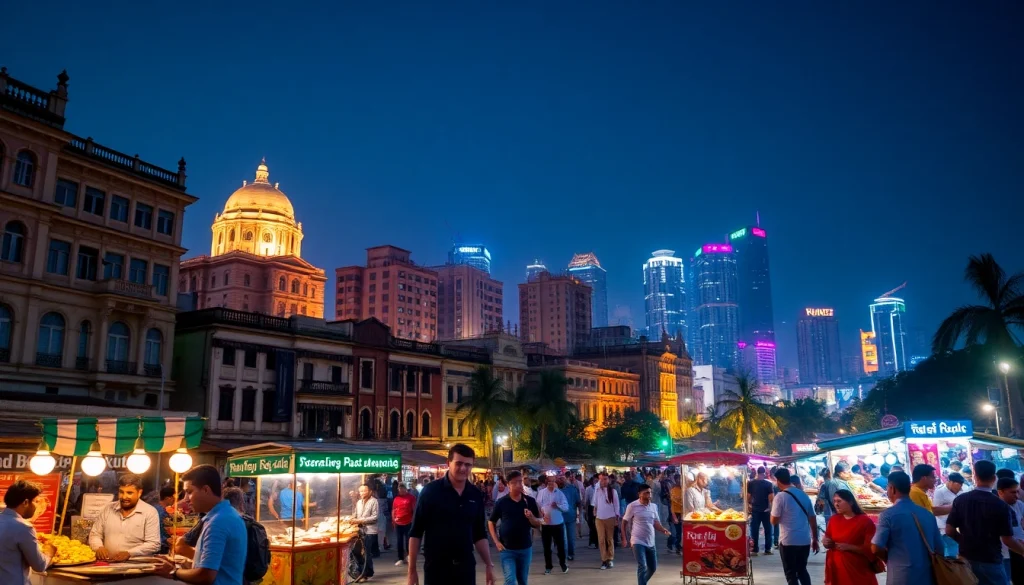Introduction to Karachi
Overview of Karachi’s Significance
Karachi, the largest city in Pakistan, serves as the nation’s economic powerhouse, cultural melting pot, and vital trade hub. With its strategic coastal location along the Arabian Sea, it plays a crucial role in trade, accommodating a significant portion of Pakistan’s industrial and commercial activities. Karachi’s modern skyline, vibrant street life, and diverse communities reflect its historical significance and cosmopolitan status.
As the capital of the Sindh province, karachi stands out not just as a key urban center in Pakistan but also on the global stage, being one of the most populous cities in the world and a major player in international trade and commerce.
Population and Demographics
The demographics of Karachi illustrate its status as a bustling metropolis. With a population exceeding 20 million, it is a melting pot of various ethnicities, languages, and cultures. Predominantly, the population includes Sindhis, Mohajirs, Punjabis, Pashtuns, and Baloch, among others. This diversity enriches the city’s culture, offering a unique blend that contributes to its dynamic atmosphere.
Moreover, Karachi’s demographic trends show a pattern of rapid urbanization, with many people migrating from rural areas in search of better opportunities. This influx has brought both vibrancy and challenges, including housing shortages, transportation issues, and social integration concerns.
Geographical Features of Karachi
Karachi is characterized by its unique geographical features. It is situated on the coastline of the Arabian Sea, providing it with a natural harbor that has been pivotal in its development as a commercial hub. The city spans across approximately 591 square kilometers, which encompasses a variety of landscapes, from sandy beaches to industrial areas and expansive neighborhoods.
Topographically, Karachi is relatively flat, with a few gentle hills. Its coastal location influences its climate, resulting in hot summers and mild winters. The city also experiences monsoon rains, which significantly affect its annual weather patterns, impacting not only daily life but also the economy and infrastructure.
History and Cultural Heritage of Karachi
Historical Milestones in Karachi’s Development
Tracing its origins back to the early 18th century, Karachi began as a small fishing village known as Kolachi. Its strategic location led to its establishment as an important trade post for merchants and traders. The British colonial era marked a transformative period for the city; it became the capital of Sindh and underwent extensive infrastructural development, which laid the foundations for its growth into a major urban center.
Throughout the years, Karachi has witnessed significant historical events, including the partition of India in 1947, which led to a massive influx of refugees from India. This demographic shift dramatically shaped the city’s cultural landscape, introducing new traditions, cuisines, and languages that continue to thrive today.
Cultural Influences and Landmarks
Karachi’s cultural richness is evident in its landmarks and local traditions. Key historical sites, such as the Quaid-e-Azam’s Mausoleum, commemorate Pakistan’s founder, Muhammad Ali Jinnah, and symbolize national pride. Additionally, the city is home to numerous museums, art galleries, and theaters that reflect its artistic heritage.
The influence of various cultures is also evident in Karachi’s cuisine, which offers a blend of flavors from Sindhi, Balochi, Punjabi, and various international culinary traditions. Popular dishes such as Biryani and Nihari, along with street food like Sindhi Karhi, showcase the city’s diverse gastronomic landscape.
Modern Evolution of Karachi
In recent decades, Karachi has evolved dramatically, transforming into a modern metropolis. Its economic activities have diversified beyond traditional sectors like textiles and shipping to include information technology, finance, and telecommunications. This economic diversification has attracted both local and foreign investment, encouraging the establishment of new enterprises and startups.
Moreover, urban planning and development initiatives are underway to address the challenges of rapid population growth. Despite facing issues such as infrastructure deficits, housing shortages, and environmental concerns, Karachi continues to forge ahead with development projects aimed at enhancing the quality of life for its residents.
Economy and Industry in Karachi
Major Economic Sectors in Karachi
Karachi’s economy is robust and multifaceted. As the industrial and commercial heart of Pakistan, it houses several major economic sectors, including shipping, finance, and manufacturing. The Port of Karachi is one of the largest and busiest ports in South Asia, handling a significant amount of the nation’s cargo shipments.
Furthermore, Karachi is known for its textile industry, which remains a crucial contributor to the economy. The city produces a substantial portion of Pakistan’s textile exports, making it an integral player in the global supply chain. The financial sector is also significant, as Karachi hosts the Karachi Stock Exchange and numerous banks that drive the country’s economic activities.
Emerging Industries and Innovation
In addition to its traditional economic sectors, Karachi is witnessing the emergence of new industries, particularly in technology and services. The city has rapidly developed a burgeoning tech startup ecosystem, fostering innovation and attracting investment. Initiatives such as incubators and innovation hubs are supporting entrepreneurs in the technology space.
This shift towards knowledge-based industries is essential for creating job opportunities and promoting sustainable economic growth. The emphasis on technology and innovation is paving the way for Karachi to become a competitive global player in various sectors.
Challenges Facing Karachi’s Economy
Despite its economic prowess, Karachi faces several challenges that threaten its growth potential. Infrastructure deficits, insufficient public services, and a lack of effective governance often hinder development efforts. Traffic congestion, inadequate waste management, and energy shortages are common issues that affect daily life and economic productivity.
Moreover, economic inequalities and unemployment persist, highlighting the need for comprehensive policies aimed at social welfare and economic inclusivity. Addressing these challenges requires collaboration between government agencies, businesses, and the community to ensure sustainable development and improved living standards for all residents.
Tourist Attractions in Karachi
Top Historical Sites to Visit
Karachi is rich in historical landmarks that offer a glimpse into its past. Some of the most notable sites include the Mohatta Palace, a stunning example of Indo-Saracenic architecture, and the Frere Hall, known for its beautiful gardens and art exhibitions. Another significant site is the Chaukhandi Tombs, which date back to the 15th century and showcase intricate carvings and architecture typical of the region.
For a more modern touch, visitors can explore the vibrant neighborhood of Clifton and its popular beaches like Clifton Beach and Sandspit, attracting both locals and tourists. These beaches not only offer recreational activities but are also a reflection of the city’s coastal culture.
Traditional Markets and Dining Spots
Karachi’s traditional markets are a treasure trove of local culture and commerce. The Empress Market is one of the oldest and busiest markets, bustling with vendors selling fresh produce, textiles, and artisan crafts. The market ambiance provides a rich sensory experience that embodies the spirit of Karachi.
Dining in Karachi is a journey through diverse flavors. Popular dining spots range from local food stalls offering exquisite street food to high-end restaurants serving traditional Pakistani dishes. Experience the local culture through culinary delights like Seekh Kebabs, Biryani, and Samosas, each telling a story of Karachi’s rich food heritage.
Events and Festivals Celebrated in Karachi
Karachi hosts numerous events and festivals that celebrate its cultural diversity. Annual festivals such as the Karachi Literature Festival and the Karachi Art Festival bring together artists, writers, and intellectuals, fostering a spirit of creativity and cultural exchange. These events are not only essential for promoting local talent but also for attracting international interest.
Religious festivals like Eid-ul-Fitr and Eid-ul-Adha see grand celebrations, with communal prayers, feasting, and charity, reflecting the city’s strong community spirit. Such festivals underline Karachi’s vibrant social fabric where traditions are cherished and celebrated collectively.
Living in Karachi: A Local’s Perspective
Daily Life and Community in Karachi
Life in Karachi is characterized by a vibrant mix of cultures, opportunities, and challenges. Residents enjoy a blend of traditional and modern lifestyles, with an array of cultural festivals, social gatherings, and recreational activities. The community spirit is strong, often visible in local celebrations, food sharing, and neighborhood support networks that bring people together.
However, daily life also comes with its challenges, with traffic congestion and high living costs impacting the quality of life. Finding a balance between work and social responsibilities is essential for Karachiites, who thrive amid the city’s dynamic pace.
Transportation and Infrastructure in Karachi
Transportation in Karachi consists of various modes, including buses, rickshaws, and ride-sharing services. The infrastructure, however, struggles to keep pace with the city’s growing population. Initiatives to expand and improve public transport systems, such as the Karachi Circular Railway, aim to alleviate traffic congestion and enhance mobility for residents.
Investments in road networks and pedestrian pathways are essential for creating a more accessible urban environment. These infrastructure improvements are vital for supporting economic growth and ensuring a high quality of life for Karachi’s residents.
Safety and Healthcare Services in Karachi
Safety in Karachi has historically been a concern due to crime rates and political unrest. However, significant improvements have been made in recent years through increased law enforcement efforts and community programs aimed at crime prevention. Residents are encouraged to stay informed and involved in local initiatives that foster safety and security.
Healthcare services in Karachi vary widely, with numerous public and private hospitals catering to the population. Although many healthcare providers offer quality services, access to affordable care remains a challenge for many residents. Public health initiatives focusing on education, vaccination, and preventive care are crucial for improving overall health outcomes in the city.



